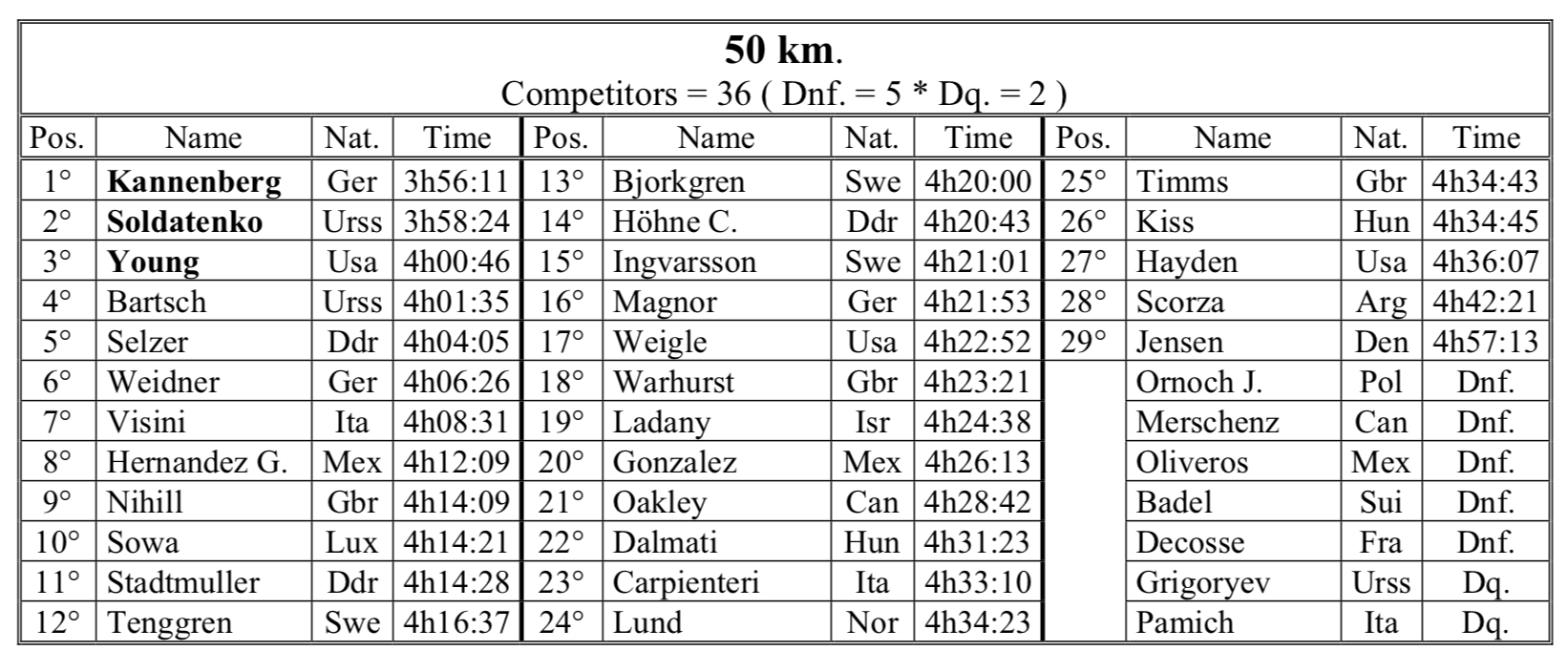Fifty years ago on 3 September, two days before an immense tragedy, Bernard Kannenberg won the first Olympic 50km in Munich (GER) with a mark under 4:00:00.
After an exciting fight with Venyamin Soldatenko (USSR) he set the new Olympic record in 3:56:11.
Kannenberg was no child prodigy when it came to athletics. In fact, he didn’t take up serious race walking until he was 27 – and maybe that was a good thing.
There was no early burn-out, so that by training up to six hours a day he achieved a world record 50km on 27 May 1972, just three years from the moment he got serious. And some record it was.
That 3:52:45 in Bremen improved the existing mark by more than eight minutes from the official time set by Soviet Union’s Mikhail Lavrov in 1961. Even an unofficial 3:55:36 from Gennadiy Agapov, also USSR, was nearly three minutes in arrears.
Kannenberg had taken part at the German Championships for the first time just two years before. He finished third in the 20km and 50km in 1971 and was three-time German champion in 1972.
Too good in Munich
It became apparent that what would become known as ‘Golden Sunday’ for the hosts would result in a head-to-head battle between the West German and Venyamin Soldatenko from the Soviet Union.
The latter was the existing European champion from the year before in Helsinki, and from the gun the pair set off leaving the rest of the 36-strong field for dead.
At 10km, both clocked 45:55. The closest pursuers were Otto Barch of the Soviet Union and Peter Selzer from East Germany in 47:10 – more than a minute in arrears.
The course around the Olympic Park outside the Munich stadium was nothing like a modern circuit. For a start, it was a 5km loop, as opposed to the modern one-kilometre up-and-down race.
Race walkers later complained of the gravelly surface in places. There was even a small bridge to negotiate each lap.
Kannenberg knew all about the bridge. He had started the shorter race, but – either because he reportedly stumbled and fell or just didn't feel he had the legs – pulled out shortly after 10km.
Either way, it acted as a dress rehearsal for the longer event, and by 20km (1:32:59) the pair locked at the hip had two plus minutes over Larry Young from the USA (1:35:08), the 1968 Olympic bronze medallist.
Nothing separated Kannenberg and Soldatenko at 30km – 2:20:03 – but the cracks started to show six kilometres later.
The German edged a couple of metres in front, and by 38km had forged a decisive gap.
Defending champion Christoph Höhne, who was to finish a lowly 14th this time, remarked: “We did the same work; the same kilometres, but Bernd was so much faster than me.”
With two circuits, and 10km left, the eventual winner was 21 seconds ahead, 3:07:52 to 3:08:13, and fast losing his shadow.
By the time Kannenberg re-entered the stadium to cross the line first in 3:56:11.6 – more than two minutes ahead of Soldatenko – that Golden Sunday was in full swing.
Not only was there gold for the German, there were first places also for Hildegard Falck in the women’s 800m and Klaus Wolfermann in the men’s javelin, plus a silver for Heide Rosendahl in the pentathlon behind Great Britain’s Mary Peters.
Young sensibly kept his powder dry and, like in Mexico, came through to take bronze for the second Olympics in a row.
(Thanks to Paul Warburton - World Athletics)
And the Italians ?
The following were sent to represent Italy: the elderly champion Abdon Pamich at his fifth Olympics at the age of 39, Vittorio Visini and Domenico Carpentieri.
Pamich, despite his age, had some chances of a medal, but ran into a bad day, from all points of view, shortly after the 21st km. he was disqualified, (the only one together with the Russian Grigoryev). It was the first time that such an event had happened to the Rijeka walker, his international career ended in this way.
Carpentieri did what he could, finishing in 23rd place in a time of 4:33:10, leaving behind Antal Kiss, the Hungarian who had won silver four years earlier, and who finished 26th in 4:34:45
Visini, on the other hand, repeated the good race he had done in the 20km arriving in 7th place, but with an aftermath of controversy.
There had been a strong controversy in Italy for not enterering Armando Zambaldo to the Games, and Vittorio Visini was warned of his participation in the 20km only a few days before the race. Two days were not enough for Visini to recover, trying to express himself at his best in what was his favorite race.
The German walk, regardless of whether from the west or the east, had won hands down the German Games. Only the Russians had managed to get their share of glory.
Km. 50 walk – 3 september 1972
1. Bernhard KANNENBERG (FRG) 3:56:11.6 OR
2. Veniamin SOLDATENKO (URS) 3:58:24.0 (KAZ)
3. Larry YOUNG (USA) 4:00:46.0
4. Otto BARTCH (URS) 4:01:35.0 (UKR)
5. Peter SELZER (GDR) 4:04:05.0
6. Gerhard WEIDNER (FRG) 4:06:26.0
7. Vittorio VISINI (ITA) 4:08:31.4
8. Gabriel HERNANDEZ (MEX) 4:12:09.0
Splits:
Kannenberg: 10 Km. 45:55
20 Km. 1:32:59
30 Km. 2:20:03
40 Km. 3:07:52
Soldatenko: 10 Km. 45:55
20 Km. 1:32:59
30 Km. 2:20:03
40 Km. 3:08:13
Young: 10 Km. 47:32
20 Km. 1:35:08
30 Km. 2:21:58
40 Km. 3:09:45
Bartch: 10 Km. 47:10
20 Km. 1:35:40
30 Km. 2:23:49
40 Km. 3:11:49
Selzer: 10 Km. 47:10
20 Km. 1:35:40
30 Km. 2:24:26
40 Km. 3:14:40
Weidner: 10 Km. 47.24
20 Km. 1:35:58
30 Km. 2:25:01
40 Km. 3:15:53
Visini: 10 Km. 47:10
20 Km. 1:35:48
30 Km. 2:24:06
40 Km. 3:15:27
Hernandez: 10 Km. 47:47
20 Km. 1:37:20
30 Km. 2:29:24
40 Km. 3:20:36
